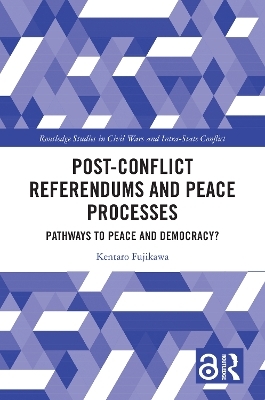
Post-Conflict Referendums and Peace Processes
Pathways to Peace and Democracy?
Seiten
2024
Routledge (Verlag)
978-1-032-66883-3 (ISBN)
Routledge (Verlag)
978-1-032-66883-3 (ISBN)
- Lieferbar (Termin unbekannt)
- Versandkostenfrei
- Auch auf Rechnung
- Artikel merken
This book provides a comparative study of the impact of referendums on conflict resolution and peacebuilding in post-conflict societies.
Post-conflict referendums have increasingly been held as part of peace processes. While policy-makers are hopeful that these referendums serve peace and democracy, the burgeoning literature on them has expressed significant reservations about their use, particularly on territorial issues, because referendums do not have mechanisms for compromise. To gauge the actual impact of these referendums on peace processes, the book systematically compares three post-conflict referendums on self-determination held with their respective central governments’ consent, in Eritrea, East Timor, and Southern Sudan. Relying on more than 70 elite interviews, it examines: (1) the rationales behind the decision to hold referendums; (2) the referendums’ impact on resolving the original self-determination conflicts; and (3) their impact on post-conflict peacebuilding inside the newly independent states. The three case studies reveal various rationales behind such referendums, and show that referendums play a limited, albeit positive, role in settling the original conflicts. Furthermore, holding referendums after civil wars has various positive, negative, and often unexpected impacts on domestic and international peacebuilding efforts inside newly independent states. This book provides careful, thorough, and well-balanced accounts of these referendums’ impact on peace processes.
This book will be of much interest to students of peace and conflict studies, African and South-East Asian politics, and International Relations.
Chapter 1 of this book is freely available as a downloadable Open Access PDF at http://www.taylorfrancis.com under a Creative Commons Attribution-Non Commercial-No Derivatives (CC-BY-NC-ND) 4.0 license.
Post-conflict referendums have increasingly been held as part of peace processes. While policy-makers are hopeful that these referendums serve peace and democracy, the burgeoning literature on them has expressed significant reservations about their use, particularly on territorial issues, because referendums do not have mechanisms for compromise. To gauge the actual impact of these referendums on peace processes, the book systematically compares three post-conflict referendums on self-determination held with their respective central governments’ consent, in Eritrea, East Timor, and Southern Sudan. Relying on more than 70 elite interviews, it examines: (1) the rationales behind the decision to hold referendums; (2) the referendums’ impact on resolving the original self-determination conflicts; and (3) their impact on post-conflict peacebuilding inside the newly independent states. The three case studies reveal various rationales behind such referendums, and show that referendums play a limited, albeit positive, role in settling the original conflicts. Furthermore, holding referendums after civil wars has various positive, negative, and often unexpected impacts on domestic and international peacebuilding efforts inside newly independent states. This book provides careful, thorough, and well-balanced accounts of these referendums’ impact on peace processes.
This book will be of much interest to students of peace and conflict studies, African and South-East Asian politics, and International Relations.
Chapter 1 of this book is freely available as a downloadable Open Access PDF at http://www.taylorfrancis.com under a Creative Commons Attribution-Non Commercial-No Derivatives (CC-BY-NC-ND) 4.0 license.
Kentaro Fujikawa is Associate Professor, Graduate School of International Development, Nagoya University, Japan, and has a PhD in International Relations from the London School of Economics and Political Science, UK.
Chapter 1: Introduction Chapter 2: Why a Referendum?: Rationales behind Post-conflict Referendums Chapter 3: Positive or Negative?: Exploring Impacts of Post-conflict Referendums on Peace Processes Chapter 4: Eritrea: from Referendum to Dictatorship Chapter 5: East Timor: from Referendum to Mixed Peacebuilding Outcomes Chapter 6: Southern Sudan: from Referendum to the 2013 Civil War Chapter 7: Conclusion
| Erscheinungsdatum | 05.12.2024 |
|---|---|
| Reihe/Serie | Routledge Studies in Civil Wars and Intra-State Conflict |
| Zusatzinfo | 2 Tables, black and white |
| Verlagsort | London |
| Sprache | englisch |
| Maße | 156 x 234 mm |
| Themenwelt | Sozialwissenschaften ► Politik / Verwaltung ► Europäische / Internationale Politik |
| ISBN-10 | 1-032-66883-0 / 1032668830 |
| ISBN-13 | 978-1-032-66883-3 / 9781032668833 |
| Zustand | Neuware |
| Haben Sie eine Frage zum Produkt? |
Mehr entdecken
aus dem Bereich
aus dem Bereich
Studienbuch
Buch | Hardcover (2023)
De Gruyter Oldenbourg (Verlag)
CHF 62,90
Amerikas Strategie der Vorherrschaft und der Kampf um Eurasien
Buch | Softcover (2024)
NOMEN Verlag
CHF 27,95


